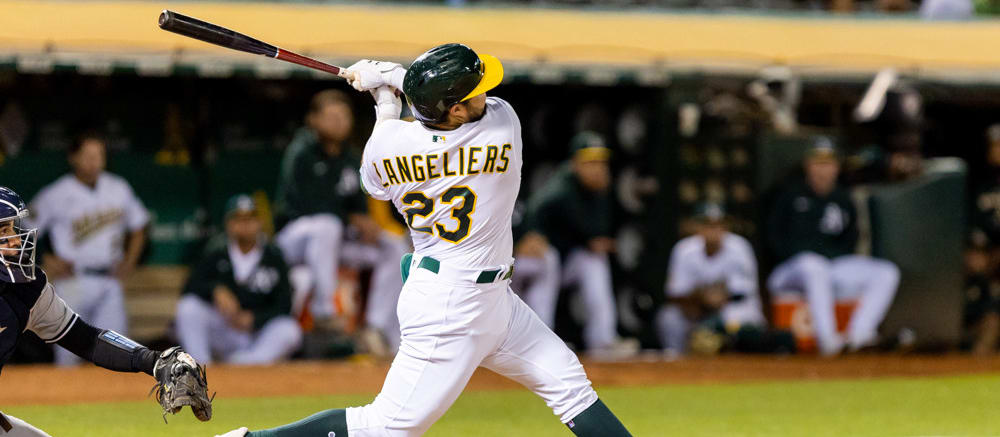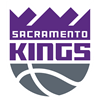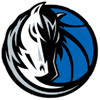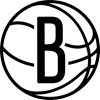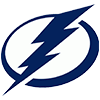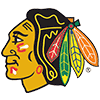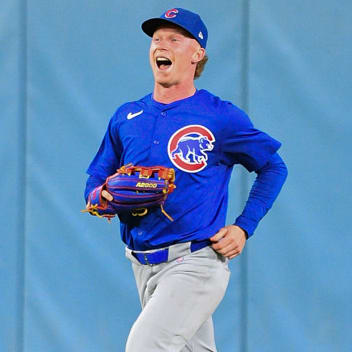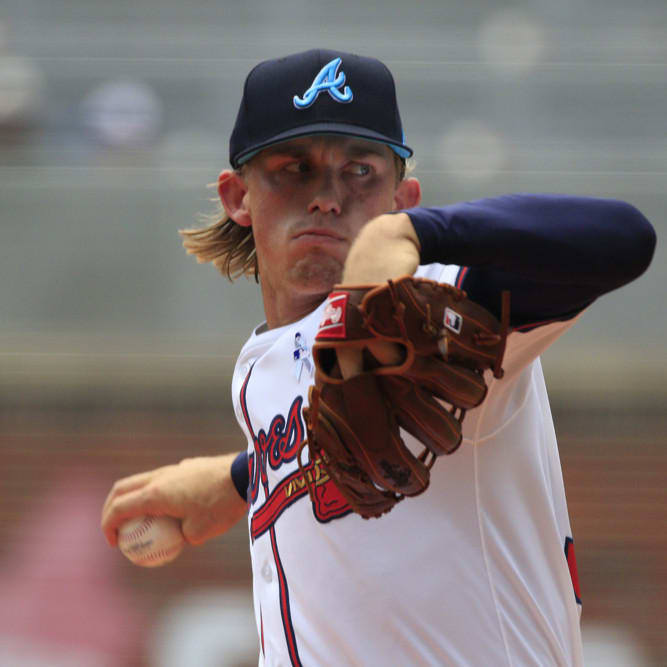Bat Speed for hitters has become what velocity is for pitchers. Both stabilize immediately (three swings for a batter) and are a core component of the player's talent. For this week's leaderboard, I tried to look for breakout batters, but I mainly seemed to find hitters recovering from an injury.
Bat Speed data is available in a table at Baseball Savant or on their player pages.
To figure out how much bat speed matters, I ran a simple correlation comparing changes in Bat Speed and OPS (which correlates best with fantasy value) from 2024 to 2025 (min. 25 plate appearances). I found that, on average, OPS increases 26 points for every one mph increase in bat speed.
Here are the regular hitters who added at least one mph to their bat speed last season, as well as my thoughts on some of them. As most of the hitters were wearing down, these guys were just getting warmed up.
| Name | Bat Speed (First Four Months) | Bat Speed (Last Two Months) | Difference (mph) |
|---|---|---|---|
| Eric Wagaman | 72.7 | 75.3 | 2.6 |
| Elias Diaz | 72.3 | 74.8 | 2.5 |
| Josh Rojas | 67.5 | 69.8 | 2.3 |
| Tommy Edman | 69.9 | 72.1 | 2.2 |
| Shea Langeliers | 73.0 | 75.0 | 2.0 |
| Javier Sanoja | 67.6 | 69.5 | 1.9 |
| Jose Iglesias | 68.4 | 70.3 | 1.9 |
| Tim Tawa | 72.6 | 74.5 | 1.9 |
| Taylor Walls | 68.6 | 70.4 | 1.8 |
| Nathan Lukes | 67.3 | 69.0 | 1.7 |
| Roman Anthony | 74.4 | 76.1 | 1.6 |
| Yoan Moncada | 72.7 | 74.3 | 1.6 |
| Brandon Lowe | 73.3 | 74.8 | 1.5 |
| Michael Conforto | 73.5 | 74.9 | 1.4 |
| Myles Straw | 66.7 | 68.1 | 1.4 |
Bat Speed for hitters has become what velocity is for pitchers. Both stabilize immediately (three swings for a batter) and are a core component of the player's talent. For this week's leaderboard, I tried to look for breakout batters, but I mainly seemed to find hitters recovering from an injury.
Bat Speed data is available in a table at Baseball Savant or on their player pages.
To figure out how much bat speed matters, I ran a simple correlation comparing changes in Bat Speed and OPS (which correlates best with fantasy value) from 2024 to 2025 (min. 25 plate appearances). I found that, on average, OPS increases 26 points for every one mph increase in bat speed.
Here are the regular hitters who added at least one mph to their bat speed last season, as well as my thoughts on some of them. As most of the hitters were wearing down, these guys were just getting warmed up.
| Name | Bat Speed (First Four Months) | Bat Speed (Last Two Months) | Difference (mph) |
|---|---|---|---|
| Eric Wagaman | 72.7 | 75.3 | 2.6 |
| Elias Diaz | 72.3 | 74.8 | 2.5 |
| Josh Rojas | 67.5 | 69.8 | 2.3 |
| Tommy Edman | 69.9 | 72.1 | 2.2 |
| Shea Langeliers | 73.0 | 75.0 | 2.0 |
| Javier Sanoja | 67.6 | 69.5 | 1.9 |
| Jose Iglesias | 68.4 | 70.3 | 1.9 |
| Tim Tawa | 72.6 | 74.5 | 1.9 |
| Taylor Walls | 68.6 | 70.4 | 1.8 |
| Nathan Lukes | 67.3 | 69.0 | 1.7 |
| Roman Anthony | 74.4 | 76.1 | 1.6 |
| Yoan Moncada | 72.7 | 74.3 | 1.6 |
| Brandon Lowe | 73.3 | 74.8 | 1.5 |
| Michael Conforto | 73.5 | 74.9 | 1.4 |
| Myles Straw | 66.7 | 68.1 | 1.4 |
| Julio Rodriguez | 76.0 | 77.4 | 1.4 |
| Alex Call | 65.7 | 67.0 | 1.3 |
| Joey Bart | 73.9 | 75.2 | 1.3 |
| Kyle Farmer | 66.3 | 67.6 | 1.3 |
| Michael Harris II | 73.9 | 75.1 | 1.2 |
| Tyler Fitzgerald | 69.1 | 70.3 | 1.2 |
| Justin Turner | 66.0 | 67.2 | 1.2 |
| Thairo Estrada | 71.7 | 72.9 | 1.2 |
| George Springer | 73.4 | 74.5 | 1.1 |
| TJ Friedl | 69.5 | 70.6 | 1.1 |
| Brice Turang | 70.3 | 71.4 | 1.1 |
| Will Wagner | 68.9 | 70.0 | 1.1 |
| Ty France | 70.7 | 71.8 | 1.1 |
| Ramon Urias | 70.5 | 71.6 | 1.1 |
| Brendan Donovan | 69.2 | 70.2 | 1.1 |
| Yainer Diaz | 71.8 | 72.9 | 1.1 |
| Riley Greene | 75.2 | 76.3 | 1.0 |
| Brandon Nimmo | 71.9 | 72.9 | 1.0 |
| Sean Murphy | 72.4 | 73.5 | 1.0 |
| League Average | 71.8 | 71.8 |
One overall observation: the guys with the biggest jumps either started at an above-average level, or they were below average and didn't even get close to average. I wanted to focus on those going from below to above average, but there were none.
His 2.6 mph jump leads the list of batters. The increase began around the All-Star break and continued throughout the season, reaching 75.8 mph in September.
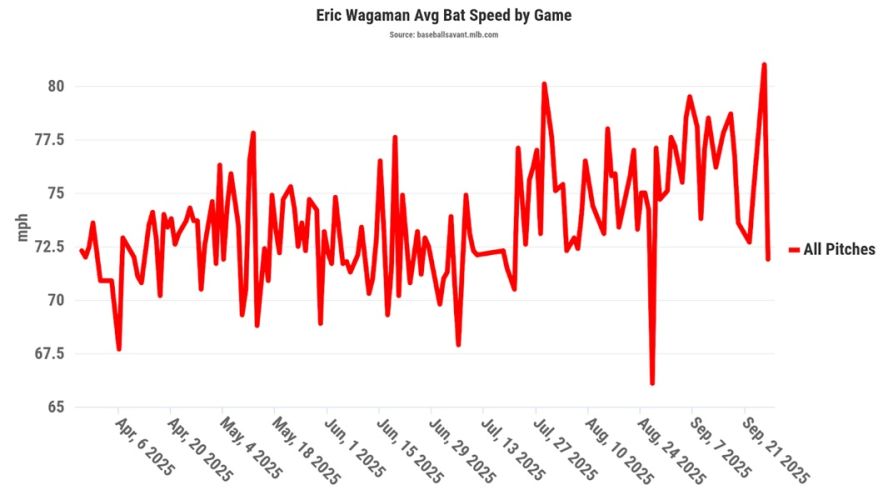
He saw his OPS jump from .641 in the first half to .744 in the second half.
One item to track is his struggles against righties over his career (.643 OPS vs RHP, .731 OPS vs LHP). He didn't get platooned much to start the season, but as some positions solidified (e.g., Connor Norby coming off the injured list), he started sitting about half the time against righties.
Is there anything the 27-year-old catcher can't do? Over his first four seasons, he's increased his contact rate and max exit velocity each year. Last year, he hit .277/.325/.536 with 31 homers and seven steals. He's the third catcher being drafted at the NFBC, and he might deserve to go earlier.
I'm not sure what's in the water in Miami, but like Wagaman, Sanoja saw a solid jump in bat speed and OPS (.634 OPS to .766 OPS).
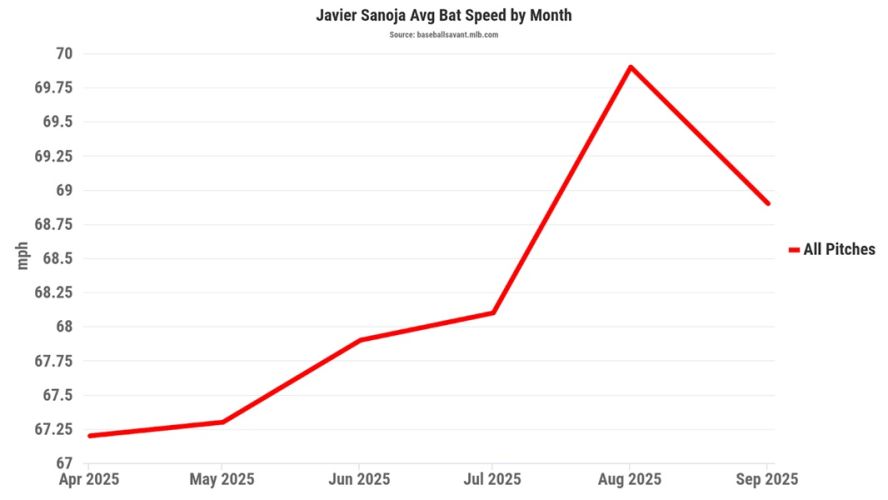
While the 23-year-old showed improvement, he wasn't a lineup regular, starting just half the time. For now, he's someone to monitor to see if he can find a full-time role.
It was surprising, to me at least, that the Rays brought Walls back. Over five seasons and more than 1,500 PA, he's accumulated just 0.7 WAR. The team likely noticed his improvement in bat speed and kept him around.
Every month, Walls improved his bat speed (from 68.1 mph to 68.6 to 68.9 to 69.0) and his OPS followed (from .444 to .577 to .688 to .731) until an early-August groin injury ended his season.
Extrapolating out his July (two homers and four steals in 74 plate appearances) to a full season, he'd be at twelve homers and 24 steals while batting .270/.299/.432. That's similar to the 2025 production of Bryson Stott, Maikel Garcia and Nico Hoerner. The odds that he'll hit like a top-100 batter are slim, but for someone going around pick 600 (if at all), he's a solid option.
The highly touted 21-year-old prospect added bat speed. I won't be surprised one bit if he's a first- or second-round draft pick next season.
Bart's jump was not from reaching a new talent level, but getting back his previous bat speed. He missed some time early in the season because of a back injury and concussion. Those injuries could have slowed him down.
Looking back over the past two seasons, Bart has been a solid contributor (about 20 percent above league average) when healthy. A solid last-round catching fallback if you miss out on the top choices.
Just one year, it would nice for Harris to start the season out on fire instead of building up. He hit .210/.234/.317 in the first half with his bat speed in the toilet.
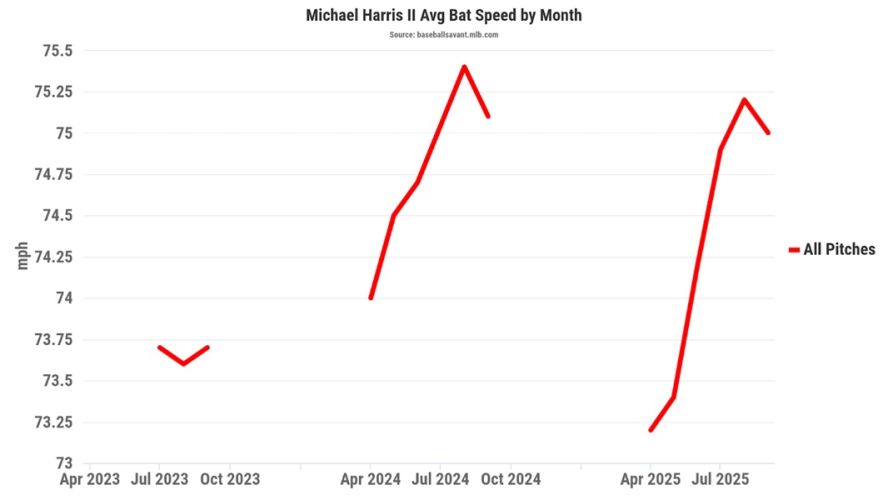
I have no idea on how to value him next season.
Like Bart, Friedl's late-season Bat Speed bump (70.6 mph) put him back up to his 2024 average (70.5 mph). On May 14, Friedl suffered a sore wrist from this hit by pitch, and his bat speed tanked:
It took him until August to return to his 2024 bat speed.


